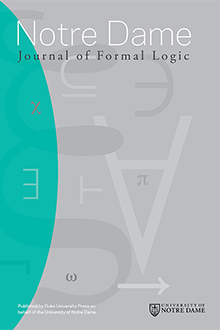Abstract
This paper concerns the epistemic status of "Hume's principle"--the assertion that for any concepts $F$ and $G$, the number of $F$s is the same as the number of $G$s just in case the $F$s and the $G$s are in one-one correspondence. I oppose the view that Hume's principle is a stipulation governing the introduction of a new concept with the thesis that it represents the correct analysis of a concept in use. Frege's derivation of the basic laws of arithmetic from Hume's principle shows our pure arithmetical knowledge to arise out of the most common everyday applications we make of the numbers. The analysis of arithmetical knowledge in terms of Hume's principle ties our conception of number to the interconnections of which our concepts of divided reference are capable; in so doing, it locates the origin of our conception of number in the structure of our conceptual framework.
Citation
William Demopoulos. "On the Origin and Status of our Conception of Number." Notre Dame J. Formal Logic 41 (3) 210 - 226, 2000. https://doi.org/10.1305/ndjfl/1038336842
Information





